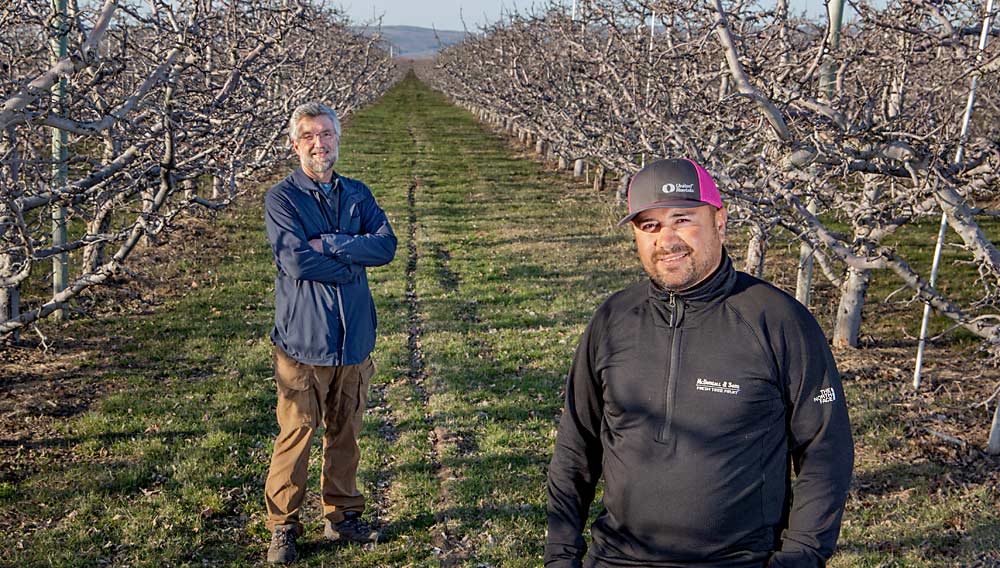—story and photo by Ross Courtney

Tired of bruising his shoulders during harvest, Luis Alejandro Barrera bought a used backpack at a flea market and stitched his own padded bucket harness.
This year, while the H-2A worker straps on his creation for Washington’s Columbia Basin cherry season, he fosters ambitions to make more harnesses, save the shoulders of fellow laborers and make a few bucks off his ingenuity.
“I want it to work well for my co-workers, because if we’re able to get this out to everybody, they’re going to be able to work better and be more productive,” Barrera said in Spanish. “And if you are more productive, then you can be able to earn more money.”
He has help.
Erik Nicholson, a former national vice president of the United Farm Workers union, wants to aid Barrera and other laborers who have innovations in mind but lack the resources to develop them. Now a private ag industry consultant, Nicholson established Semillero de Ideas, or Nursery of Ideas, to blaze a trail for laborers to work up their inventions and — in the end — profit from them.
In the fall, Barrera won the group’s first Innovation Challenge, scoring him a $1,000 prize and the help of a pro-bono attorney. That attorney has advised him not to publicly share photos of his design until he has a patent, which could differentiate his approach from other padded harnesses on the market.
Industry response
Barrera works for McDougall and Sons, a vertically integrated producer with orchards in Wenatchee and the Columbia Basin.
“Seems like a great idea,” Matt Jeffery, a McDougall area manager, said of the harness. So is the Semillero de Ideas cause; employers should listen to their workers’ ideas, he said.
The responsibility for commercializing would fall to the inventor, but employers could help by connecting them to contacts they may have, he said.
Nicholson shopped the concept of the innovation center to industry groups, such as the Washington State Tree Fruit Association, which includes listening to workers as one of its core leadership curriculum points.
The tree fruit industry needs a workforce comfortable with new ideas and tools, said Jon DeVaney, president of the association. Semillero de Ideas seems like a step in that direction, he said.
“There should be a concurrence of interest between employers and labor advocates” on workplace innovation, he said.
Walt Duflock, vice president for innovation at California-based Western Growers, likes the motivation behind Semillero de Ideas, but he stressed the two groups have had only introductory conversations so far. Western Growers is known for vetting ag tech startups and helping them commercialize with specialty crop field trials when the products are ready.
Duflock cautioned that Barrera’s harness and any of the center’s future challenge winners face a long, expensive and risky road. They will need a lot of support to form a company, he said. He recommends the new nonprofit create a grant-funded laboratory environment, with corporate and university representatives to help the would-be entrepreneurs find scale and capital.
“None of this is going to happen overnight,” Duflock said.
Just starting
Barrera and Semillero de Ideas are both just getting started, but he and the nonprofit have managed to generate some momentum.
This year, the Washington State Legislature appropriated $500,000 to the center for two years, which Nicholson envisions using to set up an innovation lab somewhat like Duflock described. Also, Rachel Noah, chief operating officer of Taggares Fruit Co. near Washington’s Tri-Cities, has told Barrera she could see her company purchasing some of his harnesses. She was a judge on the Innovation Challenge that Barrera won.
However, the market already has padded harnesses that sell for around $25 each. Workers throughout Central Washington sometimes bring their own to the job.
Barrera found his way to Semillero de Ideas when Nicholson and volunteers set up a booth at the Mattawa flea market to promote the group’s first Innovation Challenge.
The 37 other entries included padded ladder rungs to prevent shin bruising, a forked pole to make fruitlet thinning easier, and retractable gloves that protect worker fingers while maintaining food safety.
The group created the contest in response to 60 worker interviews with Josefina Luciano, a Semillero de Ideas volunteer and orchard worker near Sunnyside.
“We have no place to go to really workshop these ideas, and then who’s going to listen or pay attention to what we’re doing?” said Luciano, also in Spanish.
Nicholson translated Good Fruit Grower’s interviews with Barrera and Luciano.
Barrera, one class shy of an agronomy degree from the Autonomous University of Nayarit in Mexico, was hesitant to approach Semillero de Ideas, wondering if someone was going to steal his idea.
The father of four grew up in Nayarit, a state in west-central Mexico, where his family still owns a sugar cane farm. Barrera has a house on the property and hopes to take over and expand someday.
He and his father used to fertilize sugar cane by hand, carrying buckets on harnesses they made with ripped-up strips of fertilizer sacks. He learned to sew while mending conveyor belts in a sugar cane refinery.
“We have many ideas that we can bring to bear,” he said. •






Leave A Comment